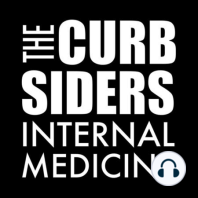33 min listen

#10: Cholesterol, lipids, statins, fish oil. Become a Master Lipidologist.
#10: Cholesterol, lipids, statins, fish oil. Become a Master Lipidologist.
ratings:
Length:
65 minutes
Released:
Jul 25, 2016
Format:
Podcast episode
Description
Summary: In this episode our guest is Master Lipidologist, Dr. Peter Howard Jones from Baylor College of Medicine and the National Lipid Association. My guest host is Dr. Paul Williams, Clinician Educator extraordinaire from Philadelphia. We explore everything you’ll ever want to know about cholesterol and lipids. Are statins still king when it comes to cholesterol lowering? Should we be rushing to use PCSK9 inhibitors? Should we throw away older drugs like fibrates? Are nonpharmacologic therapies like niacin and fish oil worthwhile? Join us for this extensive conversation. Disclosures: Dr. Jones is the Chief Science Officer at the National Lipid Association. He has served as a scientific advisor to Merck, Amgen and Sanofi. Learning objectives: 1. Identify each individual's risk for cardiovascular disease and counsel them on benefits of therapy. 2. Learn to lower atherogenic lipids by any means necessary and understand the effects of the common lipid lowering drugs 3. Effectively counsel patients on benefits of lipid lowering drugs to promote patient buy in and adherence. Clinical Pearls 1. Omega 3 fatty acids at 1,000 mg daily or more is useful for prevention of sudden death in post ACS patients. 2. Omega 3 fatty acids at dose of 4,000 mg per day is needed to lower triglycerides. Indicated if TG remain above 500 on first line therapy. 3. Hypertriglyceridemia with level above 500 on optimal statin dose, then consider addition of fibrate and/or omega-3 fatty acids. Uncertain clinical benefit in patient with moderate elevation (200-300) of triglycerides. 4. Statin intolerance can be overcome in most patients using the following methods: a. Same statin at lower dose b. Different statin c. Use of rosuvastatin or atorvastatin 3 times weekly 5. Statins are safe to take for at least 20 years and probably longer (this data is still being collected, but will be available in the future) 6. Withdrawal of statins at the end of life is not harmful and may be beneficial. Links from the Show: Studies that used fibrates for preventions of CV events: Helsinki Heart Study for primary prevention NEJM 1987 VA HIT Study for secondary prevention NEJM 1999 Withdrawal of statins at the end of life http://www.ncbi.nlm.nih.gov/pmc/articles/PMC4618294/ Expert Consensus on use of Non-Statin Drugs http://www.acc.org/latest-in-cardiology/ten-points-to-remember/2016/03/30/11/58/2016-acc-expert-consensus-decision-pathway-on-the-role-of-nonstatin National Lipid Association recommendations for patient-centered management of dyslipidemia https://www.lipid.org/sites/default/files/Recommendations-Part-1.pdf Recommended websites National Lipid Association The Heart.org (Medscape) Journal of Clinical Lipidology
Released:
Jul 25, 2016
Format:
Podcast episode
Titles in the series (100)
#1: Testosterone and hypogonadism: Miracle Cure or Libido Band Aid?: Doctors Matthew Watto, Stuart Brigham, and Tony Sidari: Internal Medicine Podcast for Primary Care, Family Medicine by The Curbsiders Internal Medicine Podcast